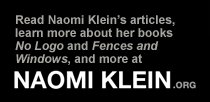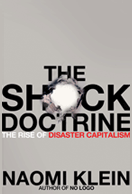The Shock Doctrine

Seven years after 'No Logo,' Naomi Klein back on bookshelves with 'Shock Doctrine'
Colin Perkel, Canadian Press, September 2, 2007
Seven years after the publication of "No Logo" launched her career as a populist, anti-globalization guru, Canada's Naomi Klein is back in bookstores this week with "The Shock Doctrine: The Rise of Disaster Capitalism," a scathing indictment of unfettered free enterprise.
Learning about the link between capitalism and the bloody excesses of Argentina's ruling junta in the 1970s planted the seeds of her latest effort, but it was the aftermath of the Sept. 11 terrorist attacks that pushed her to get writing.
"I wrote the book because I really felt personally overwhelmed and disoriented by the speed of change post-Sept. 11," Klein said during an interview at her publisher's downtown office.
"It was depressing to write and there were periods that were incredibly bleak."
Indeed, "The Shock Doctrine" is unrelenting, ripping away at the democratic facade of a capitalist system Klein accuses of paying mere lip service to fundamental notions of freedom.
Instead, she says, societies made vulnerable by natural disasters, war or other traumatic upheavals are increasingly being exploited by predatory capitalists who use the dislocation for their own profit-making ends.
The takeover of Iraq's oil fields by western multinationals after the U.S.-led invasion, the sale of tsunami-wrecked beaches in Sri Lanka to luxury resort operators, the privatization of New Orleans public schools after the flood, and the establishment of a privatized homeland security apparatus after 9-11 are all examples, she says.
When a population does resist the fire-sale of its public assets, Klein notes that the results tend to be disastrous for the resisters.
The jailed and "disappeared" of Chile and Argentina, the dead students of Tiananmen Square, impoverished Russians, the gore-stained residents of Iraq and civil liberties in the U.S. are all among victims of the same underlying philosophy of corporatization, she argues.
"Why on earth do we think that this fundamentalist capitalism that we keep pushing will do anything other than what it is already doing, which is building this dystopian of haves and have nots," Klein asks.
"If we want to know what the world looks like when these guys get their way, look to Baghdad."
At 37, Klein is best known for her international bestseller "No Logo: Taking Aim at the Brand Bullies," which has sold a million copies in 28 languages.
While "No Logo" became an anti-globalization handbook trumpeted by campus activists and rock stars as big as Radiohead, "The Shock Doctrine," while lucidly written, is far from a breezy read.
In what Klein calls "an alternative history" that runs to 561 pages without its extensive footnotes, her new tome chronicles what she sees as the pernicious influence of famed economist Milton Friedman and his Chicago School of Economics.
It is only in times of great crisis, Friedman argued, that "real change" can happen, that the slate can be wiped clean enough to allow the creation of a purist system in which market forces, unfettered by the distortions of socialism or governments, can flourish.
"This fundamentalist form of capitalism has consistently been midwifed by the most brutal forms of coercion, inflicted on the collective body politic as well as on countless individual bodies," the book states.
If knowledge is power, Klein is saying in "The Shock Doctrine," an understanding of recent historical events in the context of disaster capitalism is a kind of shock-inoculation, a way of building resistance to the predators who would strip us of our land or our freedoms.
That, she says, is the hope the book offers.
"My hope is that this book makes people better equipped to protect their interests and themselves."
A few years ago, the Economist magazine described Klein as "an angry adolescent" who produces "page after page of engaging blather" and expressed the hope that her anti-corporate sentiments were just "a passing phase."
In "The Shock Doctrine," her anti-corporate sentiments have morphed into a more sober and intensive effort at exposing what she sees as the lie that pure capitalism, democracy and freedom all go hand in hand.
"'No Logo' was very much a book of its time. It feels, looking back on it, like a period of frivolity," Klein said, struggling for once to find the exact right words.
"I had absolutely no illusion I was going to change the manufacturing supply chain but that movement has had real impact."
A former self-described mall rat, Klein is a cycling enthusiast and international columnist who lives with her documentary-maker husband Avi Lewis in Toronto. Her father-in-law is Stephen Lewis, former UN envoy for AIDS in Africa.
She has no children.
"I'm not against having kids, I haven't really decided," she says.
"It is scary, though. We will see more and more of these glimpses of a disaster apartheid future where if you have the means you can get in your car and drive away but if you don't, you're just left stranded."
Canada, where the public health-care system and social safety net exemplify a "visceral rejection of winner-takes-all," offers a good example of how a mixed economy of public and private enterprise can create a high and peaceable standard of living for most people, Klein says.
It's a system she says needs to be jealously guarded.
"If (Prime Minister Stephen Harper) were to win a majority, he would impose shock therapy as fast as he could," Klein says.
"That's not because Canadians want it or because our current system isn't working - it works - it's just not as profitable for a select few."
The "Shock Doctrine," published by Knopf Canada in Canada and in several other countries and languages, including Dutch, Spanish and Swedish, hits the shelves on Saturday, Sept. 8.
Seven years after the publication of "No Logo" launched her career as a populist, anti-globalization guru, Canada's Naomi Klein is back in bookstores this week with "The Shock Doctrine: The Rise of Disaster Capitalism," a scathing indictment of unfettered free enterprise.
Learning about the link between capitalism and the bloody excesses of Argentina's ruling junta in the 1970s planted the seeds of her latest effort, but it was the aftermath of the Sept. 11 terrorist attacks that pushed her to get writing.
"I wrote the book because I really felt personally overwhelmed and disoriented by the speed of change post-Sept. 11," Klein said during an interview at her publisher's downtown office.
"It was depressing to write and there were periods that were incredibly bleak."
Indeed, "The Shock Doctrine" is unrelenting, ripping away at the democratic facade of a capitalist system Klein accuses of paying mere lip service to fundamental notions of freedom.
Instead, she says, societies made vulnerable by natural disasters, war or other traumatic upheavals are increasingly being exploited by predatory capitalists who use the dislocation for their own profit-making ends.
The takeover of Iraq's oil fields by western multinationals after the U.S.-led invasion, the sale of tsunami-wrecked beaches in Sri Lanka to luxury resort operators, the privatization of New Orleans public schools after the flood, and the establishment of a privatized homeland security apparatus after 9-11 are all examples, she says.
When a population does resist the fire-sale of its public assets, Klein notes that the results tend to be disastrous for the resisters.
The jailed and "disappeared" of Chile and Argentina, the dead students of Tiananmen Square, impoverished Russians, the gore-stained residents of Iraq and civil liberties in the U.S. are all among victims of the same underlying philosophy of corporatization, she argues.
"Why on earth do we think that this fundamentalist capitalism that we keep pushing will do anything other than what it is already doing, which is building this dystopian of haves and have nots," Klein asks.
"If we want to know what the world looks like when these guys get their way, look to Baghdad."
At 37, Klein is best known for her international bestseller "No Logo: Taking Aim at the Brand Bullies," which has sold a million copies in 28 languages.
While "No Logo" became an anti-globalization handbook trumpeted by campus activists and rock stars as big as Radiohead, "The Shock Doctrine," while lucidly written, is far from a breezy read.
In what Klein calls "an alternative history" that runs to 561 pages without its extensive footnotes, her new tome chronicles what she sees as the pernicious influence of famed economist Milton Friedman and his Chicago School of Economics.
It is only in times of great crisis, Friedman argued, that "real change" can happen, that the slate can be wiped clean enough to allow the creation of a purist system in which market forces, unfettered by the distortions of socialism or governments, can flourish.
"This fundamentalist form of capitalism has consistently been midwifed by the most brutal forms of coercion, inflicted on the collective body politic as well as on countless individual bodies," the book states.
If knowledge is power, Klein is saying in "The Shock Doctrine," an understanding of recent historical events in the context of disaster capitalism is a kind of shock-inoculation, a way of building resistance to the predators who would strip us of our land or our freedoms.
That, she says, is the hope the book offers.
"My hope is that this book makes people better equipped to protect their interests and themselves."
A few years ago, the Economist magazine described Klein as "an angry adolescent" who produces "page after page of engaging blather" and expressed the hope that her anti-corporate sentiments were just "a passing phase."
In "The Shock Doctrine," her anti-corporate sentiments have morphed into a more sober and intensive effort at exposing what she sees as the lie that pure capitalism, democracy and freedom all go hand in hand.
"'No Logo' was very much a book of its time. It feels, looking back on it, like a period of frivolity," Klein said, struggling for once to find the exact right words.
"I had absolutely no illusion I was going to change the manufacturing supply chain but that movement has had real impact."
A former self-described mall rat, Klein is a cycling enthusiast and international columnist who lives with her documentary-maker husband Avi Lewis in Toronto. Her father-in-law is Stephen Lewis, former UN envoy for AIDS in Africa.
She has no children.
"I'm not against having kids, I haven't really decided," she says.
"It is scary, though. We will see more and more of these glimpses of a disaster apartheid future where if you have the means you can get in your car and drive away but if you don't, you're just left stranded."
Canada, where the public health-care system and social safety net exemplify a "visceral rejection of winner-takes-all," offers a good example of how a mixed economy of public and private enterprise can create a high and peaceable standard of living for most people, Klein says.
It's a system she says needs to be jealously guarded.
"If (Prime Minister Stephen Harper) were to win a majority, he would impose shock therapy as fast as he could," Klein says.
"That's not because Canadians want it or because our current system isn't working - it works - it's just not as profitable for a select few."
The "Shock Doctrine," published by Knopf Canada in Canada and in several other countries and languages, including Dutch, Spanish and Swedish, hits the shelves on Saturday, Sept. 8.






















